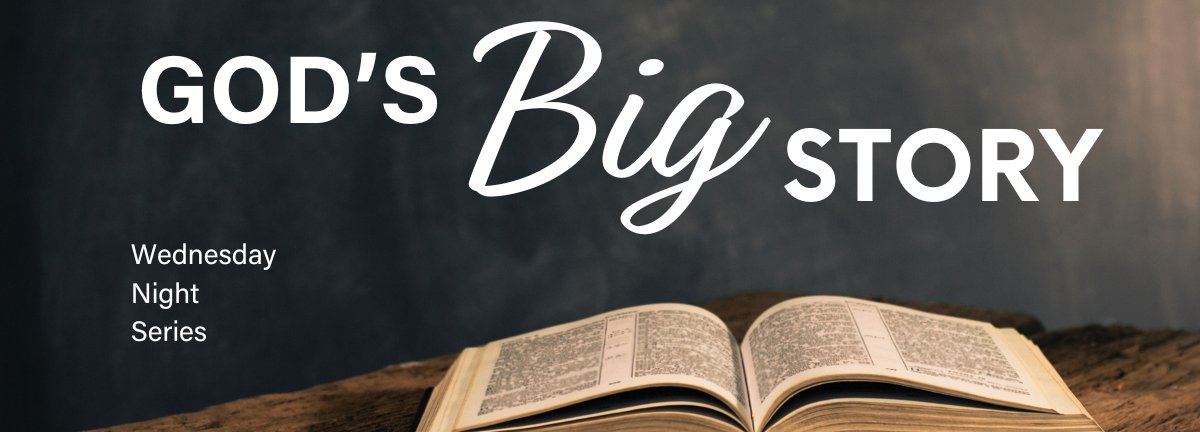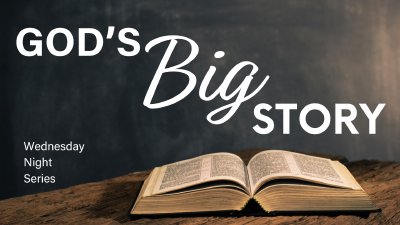


GOD'S BIG STORY - Wednesday Night Series
Wednesday Night Series
1 Kings through Elijah's story
April 17, 2024 • Dr. Derrick Wilson • 1 Kings
1 Kings Main Point: The books of 1–2 Kings continue the story of the people of Yahweh moving forward from the eternal promise given from Yahweh to David in 2 Samuel 7. The Messianic King would come through the line of David to fulfill the promises made to Abram in Genesis 12 and rule over the nations. Unfortunately, the kings found in the books of 1–2 Kings fall way short of this expectation. Historical Timeline Reign of Saul over United Kingdom of Israel – 1020–1000 BC Reign of David over United Kingdom of Israel – 1000–961 BC Reign of Solomon over United Kingdom of Israel – 961–922 BC Fall of Samaria and Northern Kingdom of Israel to Assyria – 722 BC Fall of Jerusalem and Southern Kingdom of Judah to Babylon – 587 BC Texts to Consider: · 1 Kings 2:1–4 With David’s instructions to Solomon, he echoes what other passages from Scripture? · 1 Kings 6:1–2, 37–38 How long did it take for the Temple to be constructed during the reign of Solomon? The use of trees and fruit (particularly pomegranates) invokes what location? · 1 Kings 8:46–61 What stands out about Solomon’s prayer of dedication of the Temple? · 1 Kings 9:1–9 What does the LORD say to Solomon after his building of the Temple, prayer of dedication, and benediction over the people of Israel? · 1 Kings 11:1–13 Now what has happened with Solomon? · 1 Kings 11:26–40, 12:25–29 Jeroboam, son of Nebat, is established as a king of a divided kingdom. Then, what did he do? · 1 Kings 18:20–19:18 Elijah, during and after his confrontation with Ahab, Jezebel, and the prophets of Baal, can teach us many things. What do you think he learned?
1 Samuel 20-1 Kings 7
April 10, 2024 • Dr. Derrick Wilson
1 Samuel 20 – 1 Kings 7 Main Point from last time: In the stories of 1–2 Samuel, Israel’s leadership shifts from judges to kings. The focus of the author is how God exalts the humble, brings down the proud, and rewards obedience. Timeline: Reign of Saul over United Kingdom of Israel – 1020–1000 BC Reign of David over United Kingdom of Israel – 1000–961 BC Reign of Solomon over United Kingdom of Israel – 961–922 BC Fall of Samaria and Northern Kingdom of Israel to Assyria – 722 BC Fall of Jerusalem and Southern Kingdom of Judah to Babylon – 587 BC Texts to Consider: 1 Samuel 24:16–22 How does Saul describe David after David had spared Saul’s life? 1 Samuel 31:1–13; 2 Samuel 1:11–27 How does David respond to the death of the man who was trying to kill him? 2 Samuel 2:4; 5:1–5 David was king over what? 2 Samuel 7:1–17 One of the most important passages in all of the OT. Why? 2 Samuel 11:1–12:23 David’s fall. What all happened after this horrible sin? 2 Samuel 24:18–25 1 Kings 6:1–14
1 Samuel 1-19
March 27, 2024 • Dr. Derrick Wilson • 1 Samuel 1—19
1 Samuel 1–19 Main Idea: In the stories of 1–2 Samuel, Israel’s leadership shifts from judges to kings. The focus of the author is how God exalts the humble, brings down the proud, and rewards obedience. Historical Timeline Saul 1020–1000 BC David 1000–961 BC Texts to Consider: 1 Samuel 2:1–11 What is the theme of Hannah’s song? 1 Samuel 4:1–11, 5:11–12 What did the Ark of the Covenant represent for Israel? 1 Samuel 8:1–9 The transition to monarchy…what did Samuel think? 1 Samuel 15:1–26 What was Saul’s sin? 1 Samuel 17:41–49
Judges/Ruth
March 20, 2024
Judges/Ruth Main Idea: The Israelites fell into a cycle of sin, oppression, crying out, and deliverance throughout the period of the judges. Texts to Consider: Judges 2:6–3:6 What happened when Joshua died? What is the cycle of how things go in Judges? List of Judges Othniel, Ehud, Shamgar, Deborah, Gideon (Abimelech), Tola, Jair, Jephthah, Ibzan, Elon, Abdon, Samson The depiction of the judges is one of __________________ morality. Then the last four chapters… Culminating in the last sentence of the book… “In those days there was no king in Israel. Everyone did what was right in his own eyes.” But mention of a king throws us into the book of Ruth
Joshua
March 13, 2024 • Dr. Derrick Wilson • Joshua
Joshua Main Point: As the children of Israel enter the Promised Land, Joshua exhorted the people to be faithful to the covenant and to possess the land promised to them by God. Texts to Consider: Joshua 1:1–9 What is the command that Yahweh gives to Joshua? Joshua 2:8–21 How would you describe Rahab’s thoughts about Yahweh? Joshua 3:1–13 Joshua is presented as a ______ ____________. Joshua 5:13–15 Joshua encountered an interesting person. Who was it? Was he on Joshua’s side? Joshua 6:15–21 Two things are highlighted with Israel’s battles: _______________________ _______________________ Joshua 13–22 Hint: Just look at the map! Joshua 24:14–28 Joshua gives instruction to the people similar to the way ___________ did.
Deuteronomy, Joshua 1-4
March 6, 2024 • Dr. Derrick Wilson • Deuteronomy, Joshua 1—4
Deuteronomy, Joshua 1–4 Main Point: Moses gathered the people together to remind them of their history, their failing, and to exhort them to obey the law given by God. Texts to Consider: Deut 1:1–11 The setting for the book is that of Moses _______________ to the people. Deut 4:1–14 Key words: ____________ and ______________ Deut 6:1–9 Hear ______________ Love ______________ Heart ______________ Deut 11:13–21; Num 15:37–41 This is the Shema too? Deut 18:15–22 A Prophet like Moses? True or False Prophet? Deut 30:15–20; Deut 31:7–13 Deut 34:1–12
Numbers 13-31
February 21, 2024 • Dr. Derrick Wilson • Numbers 13—31
Numbers 13–31 Main Point: The Israelites, even their leaders, continue to fail and exhibit a lack of faith in the LORD to keep His promises. Still, the LORD preserves and judges His people. Texts to Consider: Numbers 14:5–10; 26–38 What were the results of the spies’ mission and their report back? Numbers 16:12–16 What is interesting about the words used by Dathan and Abiram? What happened (Numbers 16:31–32; 16:41–50)? Numbers 20:1–13 What did Moses do wrong? Numbers 21:4–9; 2 Kings 18:4; John 3:14–15 Moses put what on a pole? Numbers 22:1–6 Why was Balak, king of Moab, so afraid of Israel? Numbers 24:15–19 Who is Balaam talking about? Numbers 27:12–23
Numbers 1-12
February 14, 2024 • Dr. Derrick Wilson • Numbers
Numbers 1:1–13:16 Main Point: As the children of Israel wander in the wilderness, their unfaithfulness is contrasted with the faithfulness of God. Hebrew Name of the Book: ________________________ Structural Divisions: Num 1–10:10 ________________________ Num 10:11–12:16 ________________________ Num 13–19 ________________________ Num 20–21 ________________________ Num 22–36 ________________________ Texts to Consider: Numbers 2:1–2 (show pictures from slides) Arrangement of the _________ Numbers 6:22–27 The Priestly __________ Numbers 9:15–23 Cloud and Fire – The LORD’s ____________ Numbers 11:1 The People _____________
Leviticus
February 7, 2024 • Dr. Derrick Wilson • Leviticus
Leviticus Main Point: Yahweh graciously provides a way for sinful Israel to live in His holy Presence. Looking back… Exodus 40:34–38, Lev 1:1 Structure of the Book Chapters 1–7 _______________ Chapters 8–10 _______________ Chapters 11–15 _______________ Chapters 16–17 _______________ Chapters 18–20 _______________ Chapters 21–22 _______________ Chapters 23–27 _______________ Holiness – God is holy, but so are places and utensils. The meaning points to uniqueness and being set apart. [Lev 19:2] Sacrifices – Priests ordination and qualifications – Ritual and moral purity – Festivals – Looking ahead… Num 1:1
Exodus 25-Leviticus 4
January 31, 2024 • Exodus 25, Leviticus 4
Exodus (Exodus 25–Leviticus 4) Main Point: God fulfilled the promise of a people to Abraham as the nation of Israel grew. The promise of a place has still not come to completion as the children of Israel escape from slavery. Texts to Consider: Exodus 1:1–7 What happened to the numbers of the family of Jacob while in Egypt? Exodus 1:15–22 What is the name of the king of Egypt/Pharaoh? Exodus 2:23–24 What verbs are used of God and his concern for Israel in this passage? Exodus 15:7–12 How did Yahweh destroy the Egyptians in the sea? Exodus 15:23–24, 16:1–3 How do the people respond to such power and deliverance from Yahweh? Exodus 19:5–6; 34:6–7 Two super important passages that we need to read together while we’re going through Exodus Exodus 34:34–35 What was going on with Moses’ face? Summary Statement:


Daily Reading Plan
Genesis 32-Exodus 25
January 24, 2024 • Dr. Derrick Wilson • Genesis 32—50, Exodus 1—25
Genesis 31:43–Exodus 25:9 Main Idea: God was faithful to the covenant He established with Abraham and was making Abraham’s family a people while bringing them to the place He had promised. Reminder from two weeks ago: Gen 12:1–3 a. ______________ b. ______________ c. ______________ Texts to Consider: 1) Gen 37:1–4, 22–36 Which characters in the story are brought into focus by the narrator? 2) Gen 38:24–26 What do we learn about Judah in this story? 3) Gen 42:35–43:10 Which characters do the talking in this narrative? 4) Gen 44:12–16, 30–34 How would you describe Judah in this passage? 5) Gen 49:9–10 6) Exod 1:1–7 Which of God’s promises is he fulfilling at the beginning of the book of Exodus? Summary Statement: God preserved the family of Abraham through famine by establishing Joseph in Egypt. God fulfills His promises, even if He doesn’t in the same timeframe that we think He should.
Genesis 12-31
January 10, 2024 • Dr. Derrick Wilson • Genesis 12—31
Genesis 11:10–31:42 Main Idea: God established a covenant with one man (Abraham), and his family, through which God would bless and bring restoration to all the peoples of the earth. 5 P’s – Purpose, Perspective, Patience, Process, Prayer Process – Comprehension (what happened), Interpretation (what does it mean, why is it recorded, why is it recorded in this location), Application (how can I apply to my life) Texts To Consider: 1) Gen 12:1–3 a. ___________ b. ___________ c. _________________ 2) Gen 12:10–20 a. Where else have I heard this? 3) Gen 14:17–24 a. Who is Melchizedek? b. Where else do we read about him? 4) Gen 15:1–6; Gen 17:9–14 a. Where in the NT are these two passages highlighted? 5) Gen 27:1–13 a. What is it about these patriarchs and their behavior? 6) What about the firstborns? a. Cain then Abel/Seth b. Ishmael then Isaac c. Esau then Jacob d. Leah then Rachel e. Reuben then many, including Joseph Summary Statement: In the pages of Genesis, we see the story of God playing out in the first several generations. What God had created as very good in Gen 1–2, man had corrupted by falling into sin up through Gen 11. But then, God established his covenant with Abraham and the family that He promised to him. Barrenness (Sarah, Rebekah, Rachel) and brokenness (even the people in this family are messed up) of these people did not thwart the purpose of God.
Genesis 1-11
January 3, 2024 • Dr. Derrick Wilson • Genesis 1—11
Text: Genesis 1–11 Main Point: God created a very good world, but sin brought about a rapid decline for humanity. The metanarrative (overarching story) of Scripture Creation, Fall, Redemption, Restoration Purpose – Perspective – Patience – Process – Prayer – Mankind as the masterpiece of God’s creation. The fall of man strained every human relationship. Eve looked for the son who would fulfill the promise. Violence grows worse. Is Noah the one? Let’s make a name for ourselves!
